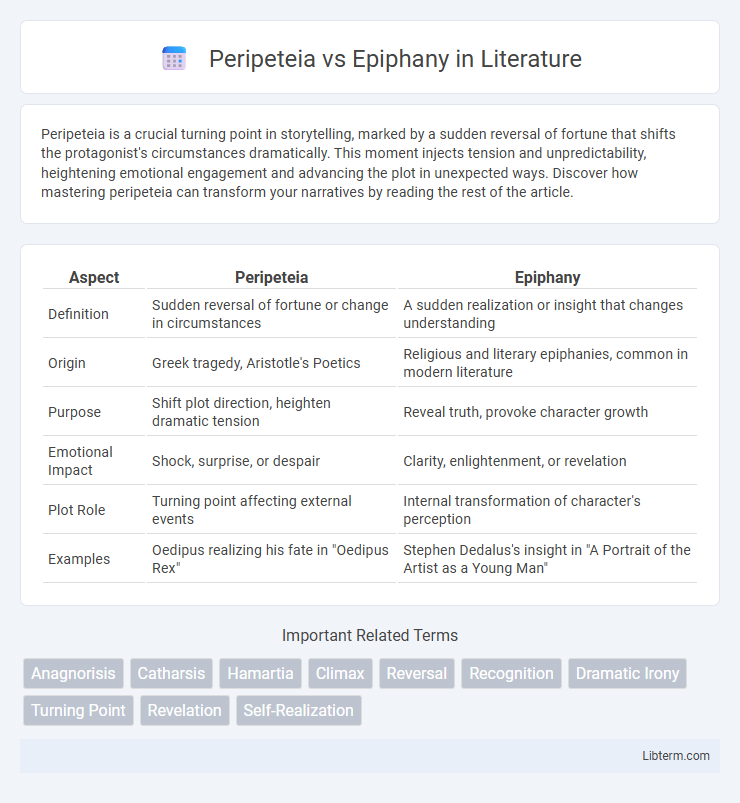Peripeteia is a crucial turning point in storytelling, marked by a sudden reversal of fortune that shifts the protagonist's circumstances dramatically. This moment injects tension and unpredictability, heightening emotional engagement and advancing the plot in unexpected ways. Discover how mastering peripeteia can transform your narratives by reading the rest of the article.
Table of Comparison
| Aspect | Peripeteia | Epiphany |
|---|---|---|
| Definition | Sudden reversal of fortune or change in circumstances | A sudden realization or insight that changes understanding |
| Origin | Greek tragedy, Aristotle's Poetics | Religious and literary epiphanies, common in modern literature |
| Purpose | Shift plot direction, heighten dramatic tension | Reveal truth, provoke character growth |
| Emotional Impact | Shock, surprise, or despair | Clarity, enlightenment, or revelation |
| Plot Role | Turning point affecting external events | Internal transformation of character's perception |
| Examples | Oedipus realizing his fate in "Oedipus Rex" | Stephen Dedalus's insight in "A Portrait of the Artist as a Young Man" |
Understanding Peripeteia: A Dramatic Turning Point
Peripeteia refers to a sudden reversal of fortune or change in circumstances, often marking a crucial turning point in a narrative. This dramatic shift alters the protagonist's trajectory, intensifying the emotional and thematic impact of the story. Unlike epiphany, which involves a character's moment of realization or insight, peripeteia emphasizes external events that reshape the plot's direction.
Defining Epiphany: Sudden Realization in Literature
Epiphany in literature refers to a sudden, profound realization or insight experienced by a character, often altering their perception or understanding of themselves or their situation. This moment of clarity typically leads to a transformative shift in the narrative, highlighting internal development rather than external action. Unlike peripeteia, which involves a dramatic reversal of fate or fortune, epiphany centers on an intellectual or emotional awakening that reveals deeper truths.
Historical Origins of Peripeteia and Epiphany
Peripeteia, rooted in ancient Greek tragedy, originated with Aristotle's Poetics as a pivotal reversal of fortune that drives the dramatic arc, exemplified in works by Sophocles and Euripides. Epiphany, evolving from early Christian theology, was historically tied to the manifestation of divine truth or revelation, with the term formalized during the early centuries of Christianity, celebrated in the Feast of the Epiphany. Both concepts emerged from distinct historical and cultural contexts, shaping narrative techniques in literature and religious expression respectively.
Key Differences Between Peripeteia and Epiphany
Peripeteia is a sudden reversal of fortune or change in circumstances within a narrative, often leading to a protagonist's downfall or critical turning point. Epiphany involves a moment of sudden realization or insight that transforms a character's understanding or perspective. Key differences between peripeteia and epiphany lie in their narrative function: peripeteia drives plot through external change, while epiphany triggers internal cognitive or emotional awakening.
Similarities Linking Peripeteia and Epiphany
Peripeteia and epiphany both serve as pivotal moments in literature where a character undergoes a profound transformation in perception or circumstance. These moments reveal critical insights that shift the narrative trajectory and deepen the emotional complexity of the story. Both devices illuminate the character's internal evolution, linking external events to psychological revelation.
Peripeteia in Classical and Modern Narratives
Peripeteia, a critical turning point in classical narratives such as Sophocles' "Oedipus Rex," marks a sudden reversal of fortune that intensifies dramatic tension and character development. In modern narratives, peripeteia often materializes through unexpected plot twists that challenge protagonists' goals, emphasizing themes of unpredictability and human vulnerability. Unlike epiphany, which involves a revelatory insight, peripeteia centers on external events that irrevocably alter the story's trajectory.
Epiphany in Prose and Poetry
Epiphany in prose and poetry serves as a moment of sudden insight or revelation that transforms the understanding of a character or theme, often unveiling deeper emotional or philosophical truths. Unlike peripeteia, which marks a dramatic reversal in the plot, epiphany emphasizes internal awakening and profound clarity within the narrative or lyrical structure. This literary device enriches the reader's engagement by highlighting pivotal shifts in perception that drive character development and thematic resonance.
Famous Examples of Peripeteia in Literature
Peripeteia, a sudden reversal of fortune, is famously exemplified in Sophocles' "Oedipus Rex," where Oedipus transitions from king to tragic exile upon discovering his true identity. Shakespeare's "Macbeth" also showcases peripeteia as Macbeth's ascent to power is swiftly overturned by his downfall and death. These pivotal moments intensify the dramatic impact by shifting the protagonist's fate abruptly, distinguishing peripeteia from epiphany, which is more of a moment of sudden realization or insight.
Notable Epiphanies in Iconic Literary Works
Notable epiphanies in iconic literary works often reveal profound moments of self-awareness or truth, such as in James Joyce's "A Portrait of the Artist as a Young Man," where Stephen Dedalus experiences a pivotal realization about identity and artistic purpose. In Virginia Woolf's "Mrs. Dalloway," Clarissa Dalloway's epiphany highlights the transient nature of existence and social roles, intensifying the novel's exploration of time and consciousness. These epiphanies differ from peripeteia, which denotes a sudden reversal of fortune, as epiphanies primarily involve internal cognitive or emotional illumination.
Thematic Impact: Peripeteia vs. Epiphany on Storytelling
Peripeteia, characterized by a sudden reversal of fortune, intensifies storytelling by creating dramatic tension and forcing characters to confront unexpected consequences that alter their fate. Epiphany, as a moment of profound realization or insight, drives thematic depth by revealing characters' inner transformations and shifting their motivations, often prompting narrative resolution or growth. Together, these devices enhance thematic impact through contrasting mechanisms: peripeteia disrupts external circumstances, while epiphany reshapes internal understanding, enriching the complexity of plot and character development.
Peripeteia Infographic

 libterm.com
libterm.com